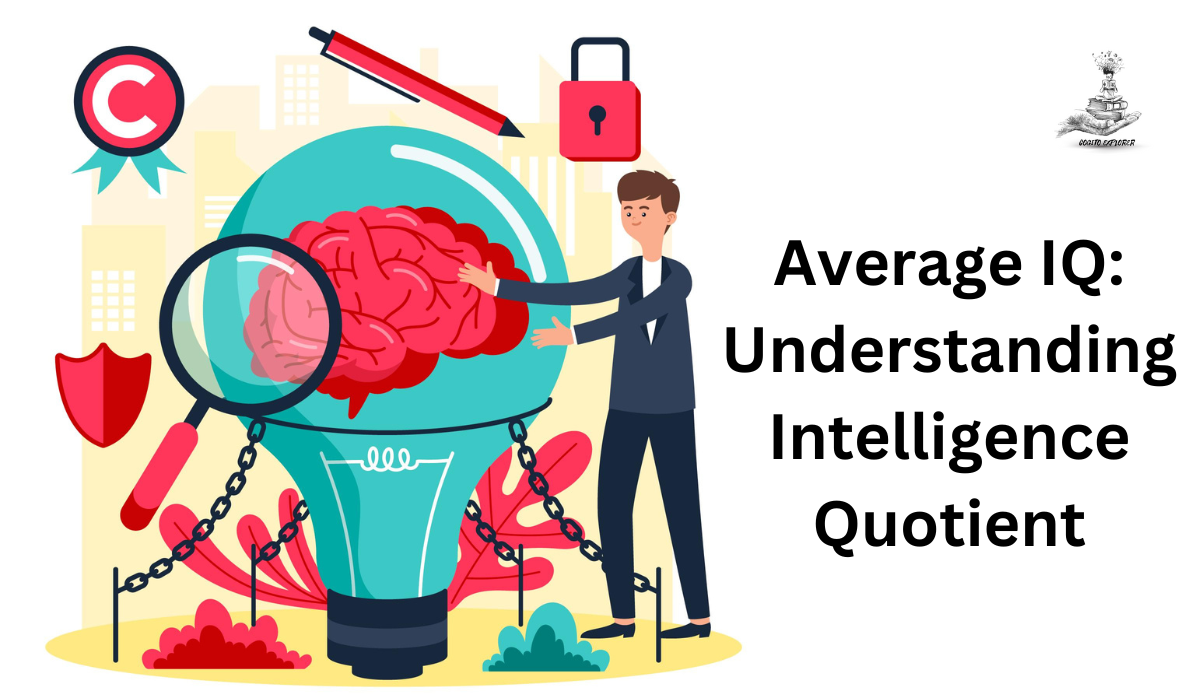Average IQ: Understanding Intelligence Quotient

Intelligence Quotient, known as IQ, is a captivating topic that sparks discussions and research. It’s essentially a measure used to understand cognitive abilities and potential in different groups of people. IQ serves as a fundamental tool in evaluating how well individuals perform mentally compared to others and Average IQ evaluates the population of individuals.
What is IQ?
IQ, or Intelligence Quotient, is a gauge of one’s intellectual capacity and problem-solving skills. It’s determined through standardized tests that evaluate different cognitive abilities like reasoning, memory, and processing speed. These tests provide insights into how efficiently a person can tackle challenges, comprehend complex information, and adapt to novel situations. Simply put it compares the intelligence level of an individual of a particular age by comparing it with the set standards for that age. It serves as a valuable tool not only for understanding individual cognitive strengths but also for gauging potential success in academic, professional, and social endeavors.
Significance of Average IQ
Average IQ is like a peek into how smart a whole bunch of people are together. It’s like taking a big picture of everyone’s smarts. When we look at it, we can see if there are patterns or differences in how smart people are. This helps us figure out where we might need to pay more attention in schools or make fair rules for everyone. It’s like a special tool that helps us understand how clever a group of people is and where we can help them shine even brighter.
Factors Influencing Average IQ
Several things can affect how smart a group of people is together. First, our environment matters a lot. Things like where we live, how much resources we have, and even what we eat can change how smart we become. Plus, going to a good school and having lots of interesting things to do can make us even smarter. Our genes, which we inherit from our parents, also play a big part in determining how clever we can be. So, it’s like a mix of our genes and the world around us that decides how bright we can shine together.
Average IQ Around the World
When we talk about the Average IQ Around the World basically we are calculating how smart people are in different places, let’s say country-wise. Different countries have different average IQs for example, the average IQ in the U.S. is about 98, 99 in the U.K., 104 in China, and 77 in India. Meaning how clever people are changes from place to place. It’s because of things like how rich a country is, what people learn in school, and the things they do every day. So, when we look at IQs globally, we see a big mix of smartness influenced by where people live and how they grow up.
Factors Affecting Regional IQ Differences
Differences in how smart people are in different places can be because some areas have more resources, better schools, and different traditions that affect how much people know and understand. So, when we look at why some regions have higher or lower average IQs, it’s because of things like how rich or poor they are, what they have access to, and what they believe in. It’s like a puzzle where different pieces of life fit together to make people smarter in some places and not as much in others.
Average IQ by Age Groups
As children grow up, their smarts, known as IQ, keep changing. This happens because of a mix of things like what they get from their parents, what they learn when they’re little, and how teachers help them in school. When kids become adults, their IQ usually stays pretty steady, but sometimes it can change because of getting older, health issues with the brain, or the things they do in their lives. So, it’s like a journey where their cleverness evolves as they grow, influenced by who they are and what they experience along the way.
Understanding IQ Scores
Understanding IQ scores involves knowing that the average score is set at 100, with variations showing how smart or less smart someone might be compared to others. However, IQ tests aren’t perfect. They might miss out on showing how smart someone really is because they don’t cover all the different ways people can be clever. Sometimes, they’re also affected by the culture or background of the person taking the test. Looking back in time, IQ scores have generally gone up over the years, thanks to better living and learning conditions. But lately, some studies suggest that IQ scores might not be going up anymore, or they might even be going down a bit. This makes us wonder if things happening in society and the world around us are affecting how smart we’re becoming.
Importance of Understanding Average IQ
Knowing how smart people are on average helps teachers and schools figure out how to teach better and make plans for kids who learn in different ways. It also shows how good a country can be at making new things and solving problems together. So, when we understand how smart people are, we can make sure everyone gets a fair chance to learn and do great things. It’s like knowing where we stand as a team and making sure everyone gets a chance to shine, which helps us all do better together.
Average IQ and Individual Potential
Helping kids become smart starts early, with things like good schools and fun activities that help them learn. It’s like planting seeds for cleverness that grow over time. Even if someone’s not super smart right away, they can still do amazing things by working hard, staying strong when things get tough, and having the right tools to learn in their own special way. So, it’s about giving everyone a chance to grow their smarts and showing them they can do great things no matter where they start from. It’s like giving them wings to fly high and reach for their dreams.
Controversies Surrounding IQ
Some people say IQ tests might not be fair because they might be easier for some groups of people than others. This can mean that some people don’t get the same chances as others. It’s like playing a game where the rules aren’t the same for everyone. Using IQ tests in schools or jobs also brings up questions about what’s fair and how everyone should be treated equally. So, it’s about making sure everyone has a fair shot and that nobody gets left behind because of a test that might not show how smart they really are. It’s like making sure the game is fair for everyone playing.
The Future of IQ Studies
The field of IQ studies is evolving rapidly thanks to advancements in neuroscience, cognitive psychology, and data analytics. Technologies like artificial intelligence and machine learning are revolutionizing how we understand and measure intelligence. These innovations open new doors for exploration, offering exciting opportunities to uncover the complexities of human intelligence in ways never possible before.
FAQs about Average IQ
What is the average IQ score worldwide?
The global average IQ score is approximately 100, based on standardized testing norms.
Does IQ remain constant throughout life?
IQ tends to stabilize in adulthood but may exhibit fluctuations due to various factors such as aging, neurological conditions, and environmental influences.
Are IQ tests culturally biased?
Critics argue that IQ tests may contain cultural biases, potentially disadvantaging individuals from diverse cultural backgrounds.
How accurate are IQ tests in predicting success?
IQ tests provide a snapshot of cognitive abilities but may not fully predict an individual’s potential for success, as success is influenced by various factors beyond intellectual capacity.
Conclusion
Average IQ helps us see how smart people are and understand how brains work. It tells us a lot about how people think and what’s going on in the world. But it’s not perfect, and there’s a lot more to being smart than just a number. To make sure everyone has a chance to shine, we need to make schools and communities where everyone feels welcome and can learn in their way. When we do that, we can unlock all the amazing things people can do, no matter who they are or where they go.







